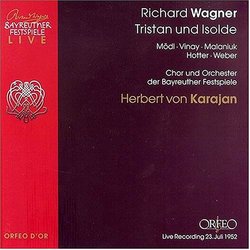| All Artists: Wagner, Vinay, Weber, Modl, Hotter, Karajan Title: Tristan & Isolde Members Wishing: 0 Total Copies: 0 Label: Orfeo D'or Release Date: 7/27/2004 Album Type: Import Genre: Classical Style: Opera & Classical Vocal Number of Discs: 3 SwapaCD Credits: 3 UPC: 675754755522 |
Search - Wagner, Vinay, Weber :: Tristan & Isolde
CD DetailsSimilar CDs
|
CD ReviewsThe Best Remastering of this Incredible Performance The Cultural Observer | 08/23/2006 (5 out of 5 stars) "In 1938, after a stellar performance of Tristan und Isolde in Aachen, the German press rightly hailed Herbert von Karajan as "Das Wunder Karajan" for his probing, deep, and intense interpretation of Wagner's cornerstone masterpiece. Fortunately, three documented versions of Karajan's Tristan exist on record: his 1972 EMI recording, a Salzburg production featuring the same principles from that recording, and this Bayreuth performance from twenty years earlier. This performance represented a high point in Karajan's Wagnerian career in the sense that it captures the conductor not only at the apex of his technical virtuosity but also at the height of his interpretive genius. This Tristan is universes removed from that slow, meditative recording that some reviewers tend to label as lugubrious, offering strength after interpretive strength in its manic intensity and the key moments in Karajan's conducting that represents an exposition on the defining moments in Wagner's score. Listen to the end of Act 1, the final exchanges of the principles in Act 2, the harrowing madness of Act 3, and the sublime finale of the Liebestod. Much like Karl Böhm in Bayreuth ten years later, Karajan exploits brisker speeds in this recording without eschewing orchestral beauty, and captures something that the older Austrian fails to address in his recording: the erotic and the sensual facets of Tristan. Twenty years before his EMI recording, Karajan already had ideas about the score that in many ways would be distilled in his studio documentation, but with the added bonus of theatricality and spontaneity. The 1952 Tristan is bewitching, bewildering, and utterly brimming with abandon, love, and death. Had any of the recording masters (EMI or Decca) of the time taken the opportunity to capture this great event (and actually, EMI and Legge were contemplating this project until Furtwängler threatened to abandon ship due to his unparalleled envy of the younger conductor), we would have been left with something far more representative of this stellar perormance, but this recording is as fine as it is, and Orfeo has taken to great lengths to remaster it and present to listeners one of the most authentic and beautiful versions of this Tristan. Karajan's cast was accordingly chosen for their ability to give the music the necessary histrionic power needed to bring home the ultimately erotic and desire-filled neuroticisms of the principals. Vocally, they are not on par with some of the greatest of the great (e.g. Flagstad, Nilsson, Vickers, Domingo, Pape, Talvela, Ludwig, Wächter, et al.), but combined with their dramatic skill, they make this night at the theater a living testament to how Wagner should be performed. Take Martha Mödl for instance. She doesn't have the voluptuous voice of Flagstad or Dernesch nor the pointed accuracy of Nilsson's instrument, but she uses her then vast resources to communicate an Isolde that is all the more real and palpable for her plights and her passions. Upon her beginning phrase in Act 1, we are made aware that something is awfully wrong with the situation and that she is somewhat powerless to remedy it. Only seldom is her Isolde classically beautiful, but she is never less than passionate. Her Act I narration and Curse is a study on verbal inflection: every syllable is clearly heard and is used to make an impact without losing the overall grasp of the picture. We know that Mödl's Isolde is furious, but we are also aware of her love that is threatening to escape her Pandora's box of a character. Her Act II is just as riveting and tender when needed, and the soprano allows her enormous voice to melt into Vinay's glorious instrument as they share the stage during the central love duet. Her Act III begins the way that it should be done: a hopeless yet a clinging on for dear life sort of "Ich bin's, ich bin's". As wonderfully as the evening started with her powerful outbursts, she treats the audience and the listener to a Liebestod that takes you to another dimension. This is how Isolde should end. Ramon Vinay partners her as Tristan, a role that much like his Otello was played to a tee during his distinguished career. He is not a heldentenor in the grand tradition like Melchior was, but his dark voice and his Latin temperament fits the character like a glove the way that Domingo does a few decades later. Rarely is his character strained, and Vinay gives his Tristan the necessary delirium that Windgassen awards in equal spades. It is not a frightening Tristan like Vickers' is frightening, but his chocolatey voice has few equals in its depth and its ability to communicate the angst and the passion that makes this character so irresistible. The rest of the characters are taken by the Bayreuth staples of the time. Ira Malaniuk is a powerful Brangäne, a great communicator, and fitting for the part of the maid. Hans Hotter is a dignified Kurwenal, perhaps better suited for Marke due to his voice's heroic dimensions, but still a force to reckon with as Tristan's consort. His voice I find is a size or two too large for the part, but he is excellent in interacting with Vinay in Act III. Ludwig Weber was one of the great German basses of the prewar era, and he gives his heart and soul to the part of Marke in this recording. His voice may not be as luxuriant as Moll, Talvela or Pape's, but he is never lacking in passion and is heads and shoulders above Greindl in providing the necessary pathos and nobility to make us sympathize with the character. All the principles begin the evening off slightly quavery, but settle nicely into their voices after a few minutes of warming up. This is no ordinary night at Bayreuth, and likewise, it is no ordinary evening for Wagner's greatest masterpiece. If pristine sound is what you want in a Tristan, look elsewhere. But for a Tristan of true distinction, this is a perfect place to start. Essential, along with the same conductor's EMI recording, Furtwängler's glorious account on EMI, Pappano's new recording with the lovely Domingo, and Böhm's Bayreuth recording from DG made fourteen years after this performance." Much improved sound Music lover | Philadelphia | 08/27/2005 (5 out of 5 stars) "This performance has been praised often, and rightly so. Modl and Vinay are on fire and superb in every way, the supporting cast is experienced and good. Karajan conducts with fire and imagination (something that can NOT be said of his later EMI recording). What is special is the sound on this issue. Always probelmatic at best, the sound of this particular performance on these discs is exceptional. Clear mono with no distortions, full sound, and every detail coming across clearly and cleanly. This set comes from the original tapes and have been lovingly remastered. The difference is unbelievable and this set must come in as a number 1 recommendation now. The price is definitely worth it for the improved sound quality. " Amazing!! Ryan Morris | Chicago, IL | 10/15/2007 (5 out of 5 stars) "Not that critics mean everything, but when a respected Wagnerian critic Alan Blythe(who recently passed) ranked this as the fourth best overall Tristan, you know it has its merits. Vinay might not replace memories of Vickers on Karajans Emi release, but as a whole, I find this much more intense and satisfactory-and genuine. Karajan isnt as maniacal about making every note so as beautiful as possible and lets Wagner speak for himself unlike the Karajan beginning in 1957 till death---you know the one----that guy who thought he knew better than the composer.
Ps AB's top five trisoldes 1. KNA\1950 2. Furtwangler\EMI 3. Bohm(DG) 4. Karajan\Bayreuth 1952" |




